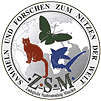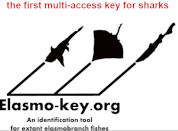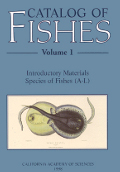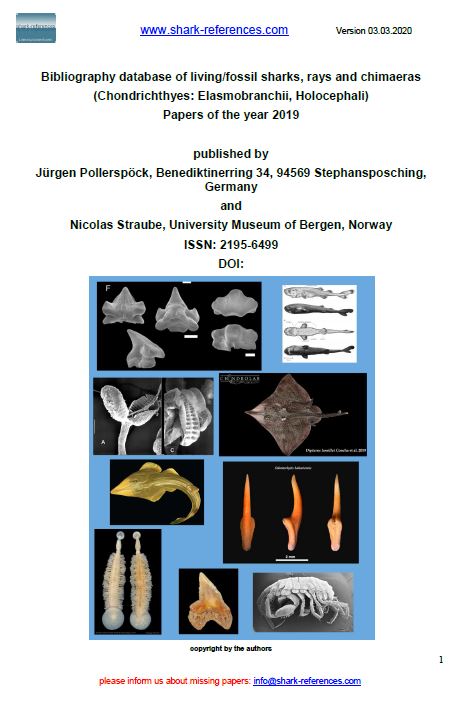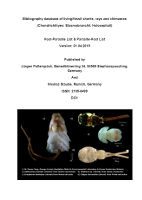
Fauna of the Miocene beds of Burma. Memoirs of the Geological Survey of India(Palaeontologica Indica), New Series, 1(3): 378 p., 25 pl.

The fish fauna of the Playa del Rey locality, a southern California Marine Pleistocene deposit. Contributions in Science, Los Angeles County Museum, 82, 1–35

Requins de l'Helvétien supérieur et du Tortonien de Lisbonne. Revista da Faculdade de Ciências da Universidade de Lisboa, 16(1), 119–280

Fish remains, mostly otoliths and teeth, from the Palos Verdes Sand (Late Pleistocene) of California. Contributions in Science, Los Angeles County Museum, 199, 1–41

Miocene sharks from India. Recent Researches in Geology, 1: 180–200, pl. 1–2

A Preliminary Note on Miocene Elasmobranchs from Orissa. Journal of the Geological Society of India, 16(1), 98–99
Otoliths and Other Fish Remains from the Chumash Midden at Rincon Point (SBa-1) Santa Barbara-Ventura Counties, California. Contributions in Science, Los Angeles County Museum, 289, 1–36

Réflexions sur la systématique des Galeoidei et sur les affinités du genre Cetorhinus à l'occasion de la découverte d'éléments de la denture d'un exemplaire fossile dans les sables du Kattendijk à Kallo (Pliocène inférieur, Belgique). Annales de la société géologique de Belgique, 102, 357–377
Vertébrés (crocodiliens, poissons) du Miocène marin de l'Argarve occidentale. Ciências da Terra (UNL), 6, 9–38

The elasmobranch fauna of coastal Miocene sediments of peninsular India. Biological Memoirs Lucknow, 5(2), 83–121, 13 fig., pl. 1–3.

Fish microfauna from Baripada beds (Miocène), eastern India. Revue de Paléobiologie, 3, 1–13


Oligocene To Recent Cetorhinidae (Vertebrata, Basking Sharks); problematical finds of teeth, dermal scales and gill-rakers. Mededelingen Van De Werkgroep Voor Tertiaire En Kwartaire Geologie, 21(4), 205–232


Haaie- en Roggentanden uit het Tertiair van Belgie. Institut royal des Sciences naturelles de Belgique, 1–171
Eocene ichthyofauna from the Subathu Formation, northwestern Himalaya, India. Journal of the Palaeontological Society of India, 32, 60–84

Paleoecology of Baripada beds (Middle Miocene), east coast of India. Bulletin of the Indian Geologists Association, 21(2), 141–153


Fossiles de Belgique. Dents de Requins et de Raies du Tertiaire de la Belgique. Institut royal des Sciences naturelles de Belgique, 184 pp.
Preliminary list of the marine fishes and other vertebrate remains from the late Pleistocene Palos Verde Sand Formation at Costa Mesa, Orange County, California. PaleoBios, 15, 9–13

Fossil elasmobranchs from the Pleistocene Shimosa Group, central Japan. [in Japanese, with English abstract] Bulletin of the Mizunami Fossil Museum, 21, 47–56

Sharks from the Middle and early Upper Miocene from Lisbon, Portugal. A check-list. Comunicações do Instituto Geológico e Mineiro, 82, 141–144

A Review of the Analysis of Fish Remains in Chumash Sites. Pacific Coast Archaeological Society Quarterly, 34(1), 25–58
The Neogene sharks, rays, and bony fishes from Lee Creek Mine, Aurora, North Carolina. In Geology and paleontology of the Lee Creek Mine, North Carolina, III, Clayton E. RAY & David J. BOHASKA. Smithsonian Contributions to Paleobiology, 90: 71–202, 84fig., 1 tabl.

Die Elasmobranchier des norddeutschen Chattiums, insbesondere des Sternberger Gesteins (Eochattium, Oligozän). Palaeontos, 8, 1–135

Les sélaciens du Pliocène de la région d'Alba (Piémont, Italie Nord-Ouest). Rivista Piemontese di Storia Naturale, 27, 261–304
Systematic, paleoecologic and paleobiogeographic analysis of the Plio-Pleistocene Mediteranean elasmobranch fauna. Atti Societa Toscana Scienze Naturali, Serie A, 113: 81–88

Inventaire des Élasmobranches (requins, raies, chimères) des dépôts molassiques du Sud-Luberon (Miocène supérieur), à Cabrières d'Aigues (Vaucluse) France. Courriers scientifiques du Parc Régional du Lubéron, Hors Série, 1–100
Late Oligocene sharks and rays from the Chandler Bridge Formation, Dorchester County, South Carolina, USA. Acta Palaeontologica Polonica, 54(4), 627–647
DOI: 10.4202/app.2008.0077
Los tiburones Lamniformes (Chondrichthyes, Galeomorphii) del Plioceno inferior de la Formación Arenas de Huelva, suroeste de la cuenca del Guadalquivir, España. Revista Mexicana de Ciencias Geológicas, 26(3), 674–686

The Neogene tropical America fish assemblage and the paleobiogeography of the Caribbean region. Swiss Journal of Palaeontology, 130(2), 217–240
DOI: 10.1007/s13358-011-0020-9

The elasmobranch fauna of the late Burdigalian, Miocene, at Werder-Uesen, Lower Saxony, Germany, and its relationships with Early Miocene faunas in the North Atlantic, Central Paratethys and Mediterranean. Palaeontos, 20, 1–170

Neogene and Quaternary Fossils of North Carolina, A Field Guide. North Carolina Fossil Club, Durham, 58 p.

Elasmobranchii in de ontsluiting aan de luchthaven te Borsbeek (prov. Antwerpen, België) Afzettingen WTKG, 36(1), 12–19
An Early Neogene Elasmobranch fauna from the southern Caribbean (Western Venezuela). Palaeontologia Electronica, 19.2.27A, 1–32
The first documented fossil records of Isistius and Squatina (Chondrichthyes) from Florida, with an overview of the associated vertebrate fauna. Bulletin of the Florida Museum of Natural History, 55(7), 139–155

Late Miocene chondrichthyans from Lago Bayano, Panama: Functional diversity, environment and biogeography. Journal of Paleontology, 91(3), 512–547
DOI: 10.1017/jpa.2017.5
The Cartilaginous Fishes (Chimaeras, Sharks, and Rays) of Calvert Cliffs, Maryland, USA. In The Geology and vertebrate paleontology of Calvert Cliffs, Maryland / edited by Stephen J. Godfrey: 45-157

The early Miocene elasmobranch assemblage from Zamaca (Chilcatay Formation, Peru). Journal of South American Earth Sciences, 91, 352–371
DOI: 10.1016/j.jsames.2018.08.004
Fossil Chondrichthyes from the Neogene of Portugal: Diversity and Occurrence. Anuário do Instituto de Geociências, 44, Article 43395
DOI: 10.11137/1982-3908_2021_44_43395
The chondrichthyan fossil record of the Florida Platform (Eocene–Pleistocene). Paleobiology, 48(4), 622–654
DOI: 10.1017/pab.2021.47

The fossil distribution of two pelagic lamniform sharks Alopias vulpinus and Lamna nasus, from South America. Historical Biology, in press
DOI: 10.1080/08912963.2023.2259409
A Review of the Paleobiology of Some Neogene Sharks and the Fossil Records of Extant Shark Species. Diversity, 16(3), Article 147
DOI: 10.3390/d16030147
